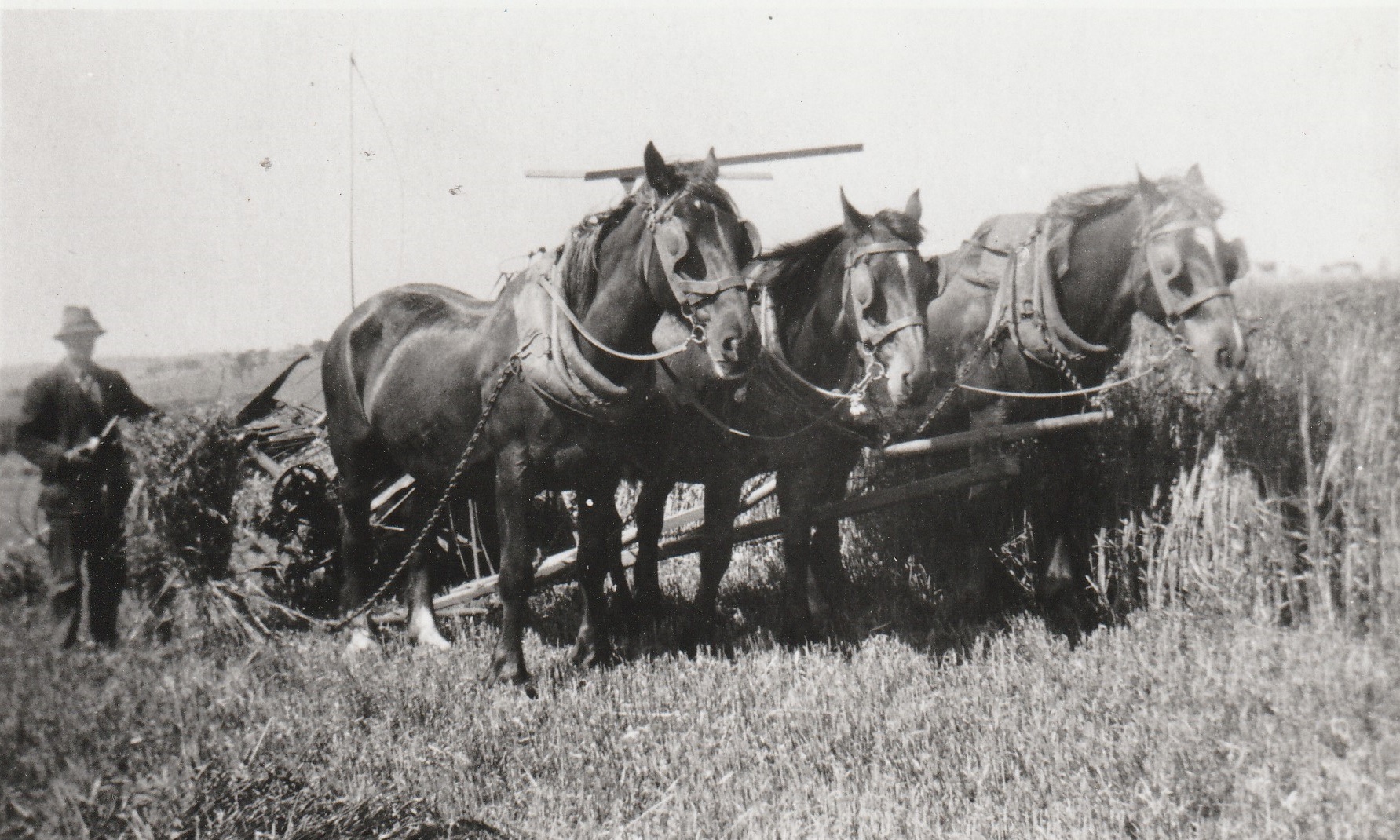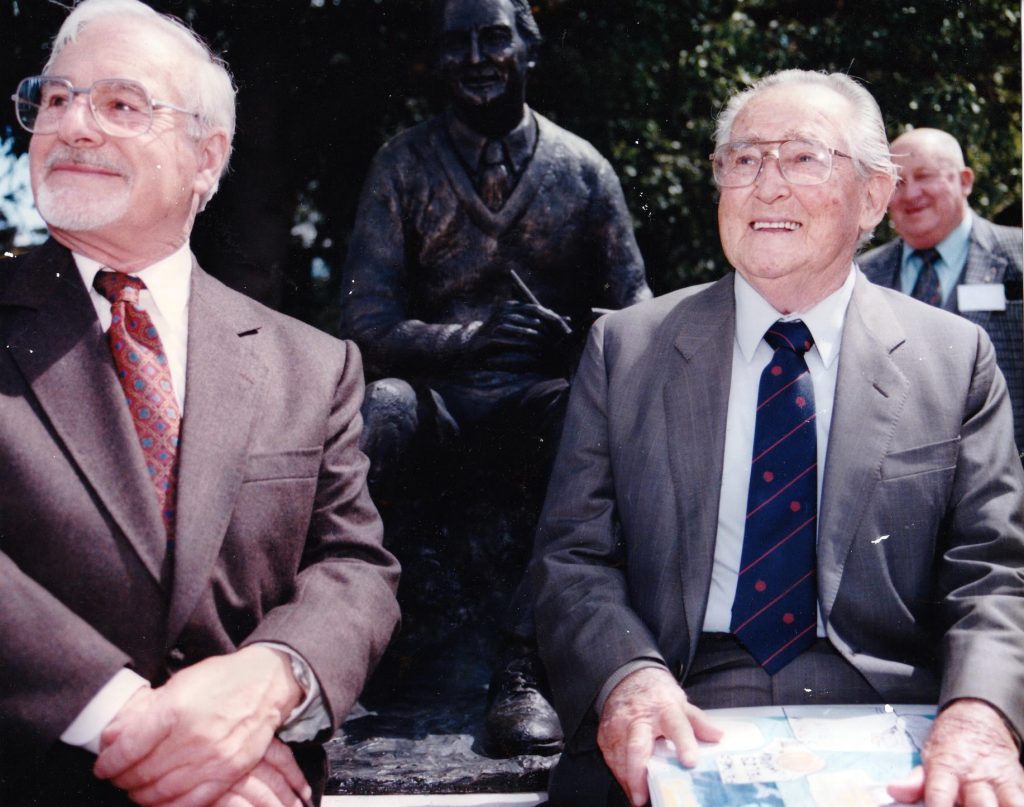COLIN’S LIFE
16 November 1920 – 4 September 2006
FAMILY

Colin’s grandparents (from the Thiele, Rothfoss, Wittwer and Grossman families) migrated from Europe to South Australia in the mid 1800s. His Thiele relatives settled near Freeling, moved to Baroota and later moved to the Bower and Sutherland areas. Early in the 20th century, Colin’s father and uncles bought allotments in what had been part of greater Anlaby Station, and it was there that they remained for the rest of their lives.
Colin, the fourth child of Carl Wilhelm Thiele and Amalie Anna (nee Wittwer), was born in the nearby town of Eudunda. He had a brother, Armin, and three sisters, Stella, Dora (Dot) and Avis, now the last surviving member of the family.
CHILDHOOD
Colin wrote of his childhood:
I had great freedom – the kind of freedom that is only possible where frontiers are wide and the world is still young. In the hills beyond our farm I roamed at will, usually alone. It was a wonderful world to grow up in with its space and solitude, its wild life, its summer heat, winter mists and the miraculous rebirth of spring.
I slept in a little room above the cellar some distance from the house, aware not only of the rich smells of the earth’s fruitfulness, but periodically shaken by exploding bottles or the squizzling and sizzling of pent up forces culminating in a cannonade of corks against the floor under my bed. This was especially so whenever my older brother became a little overenthusiastic in dealing out the hops or yeast for his home brew.

SCHOOLING

Colin spoke German at home and English at school. Both languages fascinated him, and he had a lifelong love of stories. He attended Julia Primary School (1925-32), Eudunda Higher Primary (1933-34) and Kapunda High School (1935-36). In Eudunda, he stayed with his uncles August and Fred who loved telling ghost stories by the fire at night.
He wrote of his time at Kapunda:
Up at 5:30 in the morning, my mother and breakfast waiting in the kitchen, three miles on my bike to the railway siding, train to Kapunda, long walk up the hill, lessons all day, homework until train time again, walk to the station at seven o’clock, slow haul up the line to the local siding, ride home through the darkness, steaming dinner and mother both waiting in the kitchen at half past eight, bed time at nine. A rigorous and perpetual cycle. And I loved it.
UNIVERSITY
From 1936, he studied at the University of Adelaide, where he joined a community of like-minded writers and completed a Bachelor of Arts.
He wrote, on leaving high school:
By now the writing virus was in my blood. Throughout my high school days I’d been serving a kind of apprenticeship, writing endlessly in many forms. Some were published in school magazines or local papers. Some unbelievably won prizes in agricultural shows, where they were squeezed between rashers of bacon and award-winning melons. And when I left Kapunda high school I was given a dictionary inscribed ‘For Literary Ability’.
In 1939 he worked as a junior teacher at Robertstown Primary School. A year later, he returned to Adelaide, where he completed a Diploma in Secondary Education and met his future wife Rhonda Gill.

WAR

The bombing of Darwin in early 1942 put an end to his further studies. After training as a radar technician, he was stationed firstly in Metung Victoria, then at Melville Island north of Darwin and later along Australia’s northern coast as a mobile radar maintenance officer. He married while on leave in early 1945.
He wrote:
It was still possible to write during the war, despite the difficulties. Piecemeal in tents, bark shelters and prefabricated huts. I produced a novel, sending the handwritten sections of the manuscript south for Rhonnie to type. It was a pubescent piece – groping, tentative, and unsure.
He continued writing poetry too, but the novel was never submitted for publishing.
TEACHING
After returning from war, he taught briefly at Unley High before being sent to Port Lincoln High (1946-55) and Brighton High (1956). During these years, he wrote extensively for radio, continued writing poetry and published a text book for secondary students.
In 1957 he was appointed to Wattle Park Teachers College, firstly as a lecturer and later Vice-Principal and Principal. After transitioning the college to Murray Park (now the Magill campus of the University of South Australia), he ended his career as director of the Wattle Park Teachers’ Centre (1973-1980).
Colin was a thoughtful and loving husband and father. He gave his time freely: telling stories around the dinner table, planning special outings and experiences and always willing to help or advise. A farmer at heart, he kept records of the weather and, when his health permitted, grew produce, made preserves, jams and sauces and helped Sandy on her country property.

PAIN

From his early thirties to the end of his life, Colin (as his father had before him) suffered from rheumatoid arthritis, an illness that inflames and cripples the joints of the body. Despite this, he was even-tempered, tenacious, hard-working and stoic, and had a subtle, and at times slightly wicked, sense of humour.
He wrote of this illness:
Its trademark is pain, unremitting pain. It burns in the body, sometimes like slow-moving acid from joint to joint, sometimes like a bushfire raging over the whole body. The pain is excruciating. When joints are burning with inflammation it is impossible to use them without agony. One cannot move them, cannot stand or put pressure on them, cannot lift things, cannot even lie in bed without pain.
RETIREMENT
Colin continued to write throughout his life, including during his many surgeries and hospital stays. On retirement, he was able to become a full-time writer, and travel with Rhonda to visit schools around Australia. In 1993, they moved from South Australia to Queensland where they joined their daughters and their families.
By then, the family of four had welcomed Jeff and Ron and then seven members of a new generation. Now there are seven new families:
- Ben, Jamie, Cooper and Zahra
- Tom, Suzanne, Alex, Owen, Sophia and Elliot
- Sam and Jess
- Amy, James, Cadence and Lillian
- Nick, Simone, Colin and Aida
- Scott, Emma, Sidney and Charlie
- Lara and Tony
Three months before he died, Colin met his first great grandchild, later remarking on the wonder of that gathering: ‘I felt like the patriarch of the clan.’ A further ten great-grandchildren were born while Rhonda was alive.

TRIBUTES

Taken from messages to Rhonda after Colin’s death:
From a colleague at Port Lincoln
I was very glad some of the students chose to put a snake in his case one day rather than mine. Apparently he just quietly closed the case and borrowed a book for the lesson.
From a publisher
I always think of him as one of the most kindly, creative and courageous people I’ve ever known.
From an artist/illustrator
I could hear when we last spoke on the telephone, that he was sounding fragile, and yet he still made me laugh and laugh. I can truly say I don’t know anyone as kind, as humorous and as consistently interesting as I found Colin to be.
From a lifelong friend
I don’t think I have ever thought about Colin without a pervading feeling of gladness.
From a reader
I have shed so many tears for the loss of one I didn’t really know personally – yet his gift is that I feel I did. How much more the grieving – and joy – of you who shared his life and heart.
Note: the extracts quoted from the author on this page were published in Something About the Author, Gale Research Company, Detroit, 1986